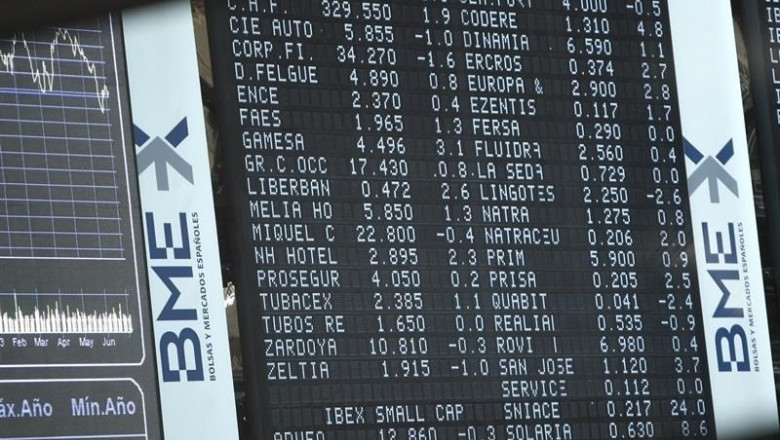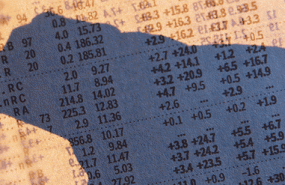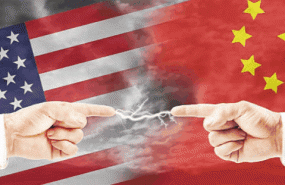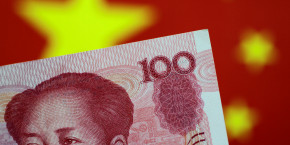
The Old Continent managed a push in the final stretch of the session and closed on the upside. The European indexes deflated hours before after the president of the United States, Donald Trump criticized the Federal Reserve via Twitter. "Our problem is not China ... it is the Federal Reserve ... they should reduce the rates further," he said. After his words, the European indexes that rose by around 1% listed slight advances. The Ibex says goodbye to the falls for now (+ 0.54%) although it has not reached 8,800 points. (Cac: + 0.6%; Dax: + 0.7%; Ftse 100: + 0.3%).
- 11.720,900
- -1,50%
Trump also led to red in Wall Street, when his futures anticipated that Tuesday's rebound would also extend to this day. "Three more central banks reduced rates," he explained. "Our problem is not China: we are stronger than ever, money is coming to the United States, while China is losing companies."
And in this sense, he points out "our problem is the Federal Reserve" for "acting too fast and squeezing too much" he adds. "They should reduce rates more and faster, and stop their ridiculous quantitative adjustment now."
Back to the selective, the titles that have risen the most this Wednesday have been Meliá Hotels (+ 3.8%) and Ferrovial (+ 2.5%). The latter,thanks to the announcement from Aena that has awarded it the works to expand the access to the 03R and 03L headers of the two runways of the Gran Canaria airport for an amount of 13.94 million euros.
On the side of the falls, Repsol (-1.8%) and Arcelormittal (-0.8%). Within the business front, Colonial stands out (+ 0.9%), which has closed one of the operations of the year with the sale of its logistics portfolio to Prologis for 425 million.
Still on the business level, we highlight the rebound of Siemens Gamesa on Tuesday thanks to Goldman Sachs. The US investment bank highlights the "monumental buying opportunity" presented by the manufacturer of wind turbines at this time, which is loosely marked as the leader of the Spanish selective.
Exceptionally, Arcelor was not the greatest faller, since the value has been greatly affected by the escalation of tensions of the last days between China and the US. The conflict has no signs of fixing itself in the near future and the nervousness in the markets is extreme while monitoring the steps taken by Washington and Beijing.
The currency war in which the trade war has transformed itself into foresees no truce in the short term. China has once again plagued the financial markets on Wednesday after the decision of the People's Bank of China to place the average anchor of the yuan at 6.9996 yuan per dollar, slightly higher than expected by the market. The measure comes after Tuesday decided to take a small step back in the currency war unleashed against the US and place the midpoint around which the renminbi fluctuates 2% below schedule and also two days after The US Treasury will designate the Asian giant as an “currency handler” officially.
Experts point out that the Chinese central bank, however, maintains its position that it will not use the yuan as a weapon in the commercial war. However, their recent movements "have shown that they have a tool to counter US actions," says Stephen Innes, an analyst at Oanda. The currency plays a fundamental role in the commercial tensions, since the devaluation of the renminbi makes Chinese exports cheaper and can counteract the effect of US taxes.
TECHNICAL ANALYSIS
In the latest sessions, “volatility has skyrocketed", both in the Ibex and in the rest of Europe as well as across the Atlantic, explained Jose María Rodríguez, technical analyst at Bolsamanía.
This Wednesday "we have marked a maximum slightly above 8,800 points but there we have stopped, at the levels that should have previously acted as support." So what we have "is a bearish channel, where the bottom of it is now acting as resistance," he added.
In theory, the fall of the last two weeks has been so vertical that prices "are screaming for a rebound" (reaction phase). "Well, as we like to remember, even to keep falling we need to attend to important rebounds against the trend."
For now, if the rebound occurs, "we do not believe that this will go beyond the area of 9,100-9,150 points." But "the weakness in our Ibex is of such importance that the moment we have a bad day we will attack the important support we have in the December lows: the 8,280 points" the expert concluded.
ASIA
The Asian exchanges have left us with mixed results this Wednesday. The Nikkei has continued in the red, with a decline of 0.25%, while Shanghai and Shenzhen have sought to leave behind the red numbers with moderate increases of 0.20%. The ASX200, also very beaten in recent sessions has risen 0.7%, while the South Korean Kospi and Hong Kong Hong Seng have closed flat. The Southeast Asian parks have also ended with a mixed sign.
This Wednesday, investors will also closely follow the result of US IEA crude oil inventories and also communicate the 10-year debt auction. At the European level, Germany has presented the data of its industrial production, and has suffered its biggest decline since 2009, although it has registered a 5.2% drop in June compared to the same month of the previous year.
Noticias relacionadas

¿La bolsa afronta una caída importante o solo es una corrección para volver a subir?

Siemens Gamesa rebota tras convencer a Goldman: "Es una oportunidad de compra"

La pelota, otra vez en el tejado de China: esta vez irá a por las empresas de EEUU


